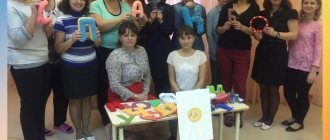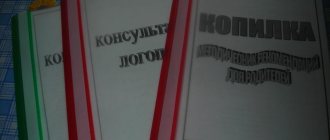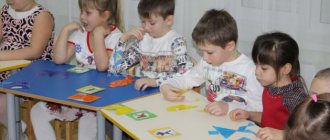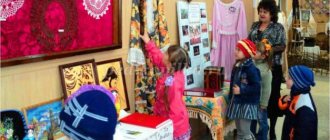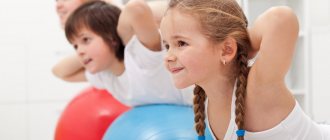“The development of the child as a whole, and not just the purity of his native speech, then, the entire intellectual development of the child and, finally, the development of character, emotional development - all this reflects the direct influence of speech.”
Lev Semyonovich Vygotsky
The Federal State Educational Standard for Preschool Education has defined target guidelines - the social and psychological characteristics of a child’s personality at the stage of completion of preschool education. Among which, speech occupies one of the central places as an independently formed function, namely: by the end of preschool education, a preschool education student understands oral speech well and can express his thoughts and desires.
Speech is also included as an important component, as a means of communication, cognition, creativity and other targets. Thus, none of the targets can be achieved without mastering speech culture. To achieve the GEF targets, systematic prevention and correction of speech disorders is necessary.
Preschool age is the most favorable for the development and formation of speech in children, and its deficiencies at this time are easier and faster to overcome. Speech activity that is defective for one reason or another has a negative impact on the formation of the child’s mental sphere and the development of his personal qualities.
First of all, defects in speech function lead to impaired or delayed development of higher mental functions mediated by speech: verbal memory, semantic memorization, auditory attention, verbal-logical thinking. This is reflected both in the productivity of mental operations and in the rate of development of cognitive activity. In addition, a speech defect leaves an imprint on the formation of a child’s personality and makes it difficult for him to communicate with adults and peers.
Objectives of speech development in the Federal State Educational Standard of Education
- mastering speech as a means of communication and culture (this means that it is necessary to form children’s oral speech at such a level that they do not experience difficulties in establishing contacts with peers and adults, so that their speech is understandable to others);
- enrichment of the active vocabulary (occurs at the expense of the preschooler’s main vocabulary fund and depends on our dictionary and the dictionary of the parents; to expand the vocabulary of children, favorable conditions are created with comprehensive thematic planning of work);
- development of coherent, grammatically correct dialogical and monologue speech (our coherent speech consists of two parts - dialogue and monologue. The building material for it is a dictionary and mastering the grammatical structure of speech, i.e. the ability to change words, combine them into sentences);
- development of speech creativity (the work is not easy, it assumes that children independently compose simple short stories, take part in composing poetic phrases, come up with new moves in the plot of a fairy tale, etc.). All this becomes possible if we create the conditions for it;
- acquaintance with book culture, children's literature, listening comprehension of texts of various genres of children's literature (The main problem is that the book has ceased to be a value in many families, children do not gain the experience of reading at home - listening, the book should become a companion for children);
- the formation of sound analytical-synthetic activity as a prerequisite for learning to read and write;
- development of sound and intonation culture, phonemic hearing (the child learns the stress system, pronunciation of words and the ability to speak expressively, read poetry).
One of the key places in the system of mastering speech culture by preschool children is occupied by a speech therapist teacher.
Basic documents regulating the tasks, content and forms of organization of the correctional pedagogical process in preschool educational institutions (for children with severe speech impairment):
Law of the Russian Federation “On Education” N 273-FZ;
Federal Law “On Special Education of Persons with Disabilities”;
Order of the Ministry of Education and Science of Russia dated October 17, 2013 N 1155 “On approval of the federal state educational standard for preschool education” (Registered with the Ministry of Justice of Russia on November 14, 2013 N 30384).
My activities in the correction of speech disorders are based on a traditional, classical program:
- System of correctional and developmental work in the speech therapy group of a kindergarten with general speech underdevelopment (4-7 years). Nishcheva N.V. St. Petersburg: 2007.
Every academic year, a primary speech therapy examination of children in the senior group is carried out according to O.B. Inshakova. Based on the results of the initial examination of the speech system, 12 children aged 5-6 years are recruited for classes with a speech therapist teacher and a plan of correctional and developmental work is drawn up for the entire school year.
When designing a correctional and developmental process, I take into account the following correctional and pedagogical principles:
- consistency;
- complexity;
- development principle;
- consideration of speech disorders in relation to other aspects of the child’s mental development;
- the principle of taking into account the structure of a speech defect;
- the principle of a workaround for correcting deficiencies in speech development;
- the principle of taking into account the zone of proximal and actual development.
In my opinion, for the successful implementation of the correctional educational process, the creation of a subject-development environment plays an important role: equipping the speech therapy room with the necessary equipment, didactic materials and visual aids. A subject environment with developmental components has been created in the classroom. Scientific and methodological support of the educational process has been systematized, speech therapy documentation is maintained, and an information block for teachers and parents operates.
The main organizational forms of speech therapy work were chosen:
– individual speech therapy work;
– subgroup speech therapy work, which is carried out within the framework of direct educational activities, directly organized activities, joint activities of the teacher and children.
All speech therapy work is carried out in the form of speech gymnastics, speech therapy training, communicative games, lexical and grammatical games, etc.
I consider the most acceptable methods in practical work to be explanatory and illustrative, reproductive, partly search, communicative, information and communication; methods of control, self-control and mutual control.
Also, in correctional work with children with speech impairments, I use the following health-saving technologies:
- articulation gymnastics,
- breathing exercises,
- finger and visual gymnastics,
- self-massage.
Correction of the speech system is impossible without the interaction of a speech therapist with teachers and parents. Therefore, I allocate a key place to this block of my activity. Work with parents is carried out in the following forms:
- speaking at parent meetings with reports on current work and its effectiveness;
- organizing individual conversations with parents, consultations on conducting speech exercises with children;
- conducting seminars and workshops;
- education through information stands in group locker rooms.
Work with educators is carried out through familiarization with the results of a speech therapy examination, speech therapy programs, and the tasks of correctional work for the school year; consultations on various topics.
For a more detailed analysis of my work, I suggest that you familiarize yourself with Table No. 1, which reflects all areas of the correctional and developmental process in the period from September 2022 to May 2022.
Table No. 1
| Month, year | correctional and developmental activities with children | interaction with teachers | interaction with parents |
| September 2020 | 1.Primary speech therapy examination of children of the middle, senior and preparatory groups. 2.Individual lessons according to an individual speech therapy support program 3. Subgroup logorhythmic lessons on the topics: “To speak clearly, you need to be friends with your fingers”; "Acquaintance with Tongue's House" | Familiarization of educators with the lists of children enrolled in speech therapy classes and the schedule. | Organizational meeting with parents of enrolled children (preparatory group). |
| October 2020 | 1.Individual lessons according to an individual speech therapy support program 2. Subgroup logorhythmic classes on the topics: “Vegetables. Adult labor in fields and gardens”; "Fruits. Labor of adults in gardens"; "Insects and Spiders"; " Migratory birds;. | Design of an interaction notebook. | 1.Designing a speech therapist’s corner on the topics: “Development of coherent speech in children” (preparatory group). 2.Individual consultations. |
| November 2020 | 1.Individual lessons according to an individual speech therapy support program 2. Subgroup lessons on lexical topics: “Berries and mushrooms. Forest in autumn”, “Pets”, “Wild animals of our forests”, “Clothes, shoes, hats”. | Consultations | Individual consultations. |
| December 2020 | 1.Individual lessons according to an individual speech therapy support program 2. Subgroup lessons on lexical topics: “Winter. Wintering birds", "Furniture", "Dishes", "New Year's holiday". | Seminar - workshop. | Design of a speech therapist's corner on the topics: “Articulation exercises” (preparatory group). |
| January 2021 | 1.Individual lessons according to an individual speech therapy support program 2. Subgroup lessons on lexical topics: “Transport”, “Professions”, “Work in the countryside in winter”. | Working with children according to the instructions of a speech therapist. | Individual consultations. |
| February 2021 | 1.Individual lessons according to an individual speech therapy support program 2. Subgroup lessons on lexical topics: “Tools of labor. Tools", "Defender of the Fatherland Day", "Animals of Hot Countries"; "Houseplants". | View GCD on speech development. | 1. Conversation “Enriching vocabulary” (preparatory group). 2.Individual consultations. |
| March 2021 | 1.Individual lessons according to an individual program. 2. Subgroup lessons on lexical topics: “Early spring. Mother’s holiday”, “Our Motherland-Russia”, “Moscow is the capital of Russia” | View GCD on speech development. | 1.Designing a speech therapist’s corner on the topics: “Children’s mastery of syllabic analysis of words” (preparatory group). 2.Individual consultations. |
| April 2021 | 1.Individual lessons according to an individual speech therapy support program 2. Subgroup lessons on lexical topics: “We read S.Ya. Marshak, K.I. Chukovsky, S.V. Mikhalkov, A.L. Barto" | Consolidation of acquired knowledge. Differentiation of delivered sounds. | 1. Questioning of parents whose children attended speech therapist classes. 2.Individual consultations. |
| May 2021 | 1.Individual lessons according to an individual plan. 2. Subgroup lessons on lexical topics: “Late spring. Insects in the spring”, “We read. A.S. Pushkin", "School. School supplies." | Filling out the performance table. | 1. Final parent meeting based on the results of the year. 2. Conversation “For those who go to school” (preparatory group). |
The final result depends on the severity of the speech disorder, on the child’s attitude towards his defect, on the general intellectual development of the child, on the parents’ understanding of the importance of correctional work and their participation in the correctional process.
By analyzing the final indicators of the speech development of children enrolled in classes with a speech therapist in the previous year, it is possible to identify positive dynamics in the development of speech culture.
The established system of work has a beneficial effect on improving children's speech. The leading role in speech development is played by an equipped developing subject-spatial environment. Correctional work with children, in turn, helps eliminate speech underdevelopment, which improves the development of all mental processes. It is also necessary to note that speech literacy helps children establish communication with peers and adults. It is important to remember that a necessary condition for positive dynamics is the education of parents in matters of correction of speech development.
Summarizing the above, we can conclude that in our preschool educational institution the necessary psychological and pedagogical conditions have been created for the full speech development of preschool children, but despite this, we continue to work on the formation and development of children’s speech.
From the experience of a teacher-speech therapist in a combined group of preschool educational institutions
The project was implemented over 3 months (December 2022 – February 2022). The frequency of events is once a week, duration is 30 minutes.
The goal of the project is to create conditions for the successful socialization and development of coherent and grammatically correct speech of children with disabilities.
Tasks:
To promote the development of the social and communicative sphere of a child with disabilities.
To form lexical and grammatical means of language in the process of joint activities of children with disabilities and children of the conditional norm.
Develop children's coherent speech skills through various types of children's activities.
To implement the project, a calendar and thematic plan of events was drawn up. When drawing up the plan, I was guided by the “Comprehensive educational program of preschool education for children with severe speech impairments”, author Nishcheva N.V. and the educational program of their preschool institution. A calendar-thematic planning was drawn up in a unified educational context
. The topics of the events, pedagogical objectives, methods and techniques used, lexical and visual material were discussed and worked out in advance with the group teachers in order to clarify the current needs, interests, and preferences of the children within the framework of the topics being lived. And if there are no such needs or preferences, then the teacher creates a problematic situation that encourages children to seek help. The teacher-speech therapist and educators work within the same lexical topic, using different games, exercises and tasks to solve various pedagogical problems. Thus, integration and continuity were built not only in working with children, but also with teachers.
The main tool in the implementation of the project is a system of activities, of which individual classes precede leisure time and are its original basis. Activities are planned in the context of the themes of the Educational Program of MBDOU No. 165 and comprehensive thematic planning of the speech therapist teacher. Individual lessons are conducted traditionally, the main objectives are to enrich vocabulary, form lexical and grammatical means of the language, and develop coherent speech skills. Thematic leisure in a combined group is my pedagogical find. This is an event that includes recreation, entertainment, elements of play, communication, and cognitive activities that promote the development of children’s speech. All children of the group attended by children with disabilities take part in thematic leisure activities. A set of such activities is aimed at developing the social and communicative abilities of a child with disabilities. All language systems acquired by him in individual lessons are included in various types of children's activities during leisure time. According to my assumptions, the acquired skills, expanded vocabulary, and material learned in individual lessons should serve as a kind of tool for communication and contribute to successful socialization during thematic leisure time. Children with disabilities will feel more confident if the proposed activity is based on already familiar material.

